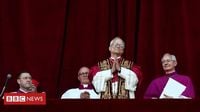On Thursday, May 8, 2025, Cardinal Robert Francis Prevost, 69, was elected as the new Pope, taking the name Leo XIV. This historic decision marks the first time a Pope has been born in the United States. Prevost, born in Chicago in 1955, has had a long career in the Church, including significant roles in Peru and at the Vatican.
Prevost was elected by at least 89 of the 133 cardinals, which constitutes two-thirds of the conclave's voters. His dual nationality—American and Peruvian—adds a unique dimension to his papacy. In 2023, he was promoted to cardinal and appointed by Pope Francis as the Prefect of the Dicastery for Bishops, one of the most influential positions within the Vatican.
As a member of the Order of Saint Augustine, Prevost joined the religious community in 1977 at the age of 22. He was ordained a priest in 1982 and soon after became a missionary in Peru, where he served until the late 1990s. In 1999, he returned to the United States to lead the Augustinian Province of Chicago. By 2014, he was named apostolic administrator of the Diocese of Chiclayo in northern Peru, a role he held for eight years before his recent elevation.
Despite his impressive credentials, Prevost's tenure as a church leader has not been without controversy. He faces accusations related to mishandling sexual abuse investigations during his time as a bishop. A woman has claimed that Prevost inadequately addressed allegations against two priests in Chiclayo, suggesting that the priests continued to celebrate Mass despite the accusations. Reports indicate that an investigation was initiated but later closed by the Vatican. Following the appointment of a new bishop, the investigation was reopened.
Additionally, Prevost's office in Chicago has been criticized for failing to inform a local Catholic school that a priest, deemed an abuser by authorities, was housed in a nearby monastery in the 2000s. This allegation raises questions about his leadership and accountability.
As Pope, Prevost will face a multitude of challenges, beginning with the need to attract and retain followers in an increasingly secular world. The Vatican has reported that the global Catholic population reached 1.4 billion in 2023, a growth of 1.15% from the previous year. However, in countries like Brazil, where the Catholic Church historically held significant influence, the situation is changing. Projections suggest that Brazil, currently the nation with the largest Catholic population, could shift to a majority evangelical demographic in the coming decades.
According to the Brazilian Institute of Geography and Statistics (IBGE), the proportion of Catholics in Brazil dropped from 74% in 2000 to 65% a decade later. In contrast, the percentage of evangelicals more than doubled between 1990 and 2010, rising from 9% to 22.2%. Similar trends are observed in the United States, where the adult Christian population has declined from 78% in 2007 to 62% in 2023, as noted by the Pew Research Center. Concurrently, the number of Americans identifying as having no religious affiliation nearly doubled, increasing from 16% to 29% over 15 years.
While the Catholic Church is experiencing growth in sub-Saharan Africa, it is also competing for followers against evangelical denominations and Islam. Many analysts and religious leaders suggest that the Church has struggled to connect with younger generations, with some viewing it as elitist and unwelcoming, particularly to poorer populations. This disconnect is evident in Brazil, where many individuals have gravitated toward a more conservative form of Christianity represented by evangelical churches.
Another significant issue facing Prevost is the declining number of priests. The Vatican estimates that there are approximately 407,000 priests worldwide, a decrease of 7,000 since 2017. In Brazil alone, a 2018 study indicated that the country would require an additional 20,000 priests to adequately serve its Catholic communities. Experts suggest that the current formation of priests in seminaries does not adequately equip them to handle the complexities of modern life, leading to disillusionment among new clergy. Moreover, contentious debates surrounding the ordination of married men and women are ongoing within the Church, with many proposals facing resistance.
Prevost will also have to navigate the ongoing tensions between progressive and traditionalist factions within the Church. His predecessor, Pope Francis, advocated for a more inclusive Church, emphasizing the importance of outreach to marginalized communities, including divorced and LGBTQ+ individuals. His statements, such as declaring that “criminalizing individuals with homosexual tendencies is an injustice,” have sparked both support and criticism. While many reformists applaud these efforts, conservative factions express concern over adherence to Church traditions.
Finally, the legacy of sexual abuse scandals continues to loom large over the Church. Reports indicate that between 1950 and 2000, France recorded 216,000 allegations of sexual abuse, while Ireland had 15,000 between 1970 and 1990. In the United States, approximately 11,000 allegations have been made. As of 2020, 2,000 priests were still alive and accused of sexual abuse. In Brazil, investigations have uncovered numerous cases, including a 2019 ruling against the Archdiocese of Paraíba, which was ordered to pay 12 million reais for the sexual exploitation of minors, although the fine was later annulled.
Pope Francis made efforts to address these issues, meeting with victims and implementing internal rules to encourage reporting of abuse. However, many victims report that a culture of silence and deference persists within the Church, enabling such abuses to continue. This crisis remains unresolved, posing a significant challenge for Prevost as he steps into his new role.
As the newly elected Pope Leo XIV, Robert Prevost's papacy will undoubtedly be scrutinized as he seeks to address these pressing challenges facing the Catholic Church in a rapidly changing world.




